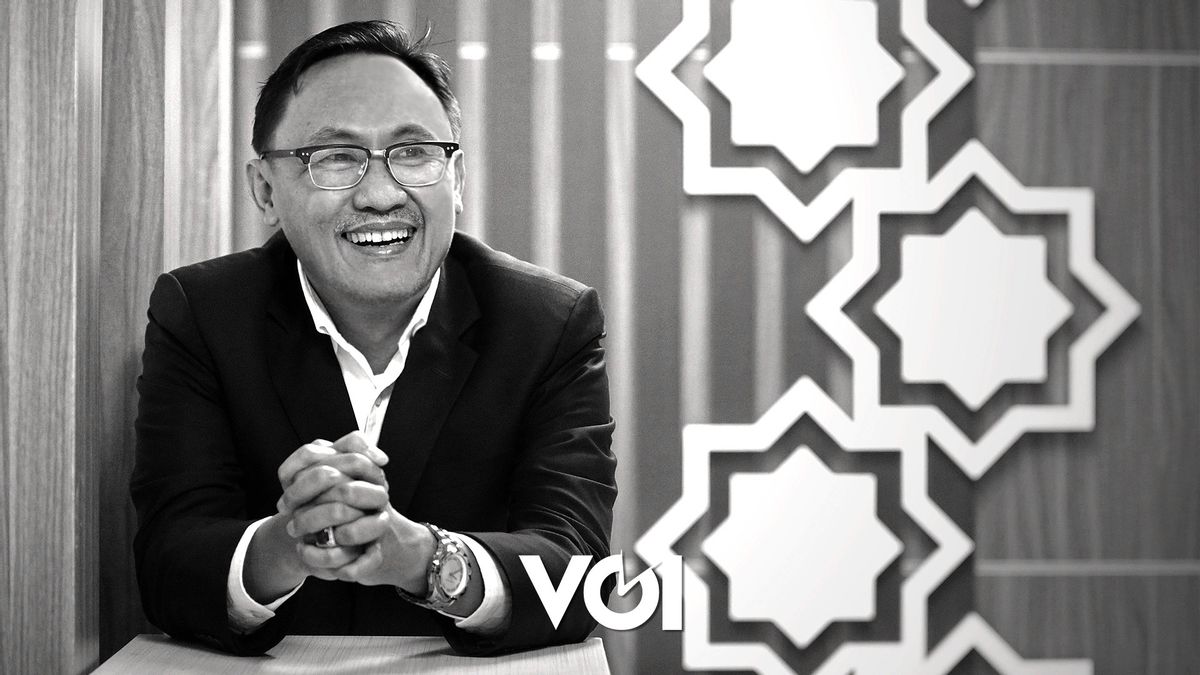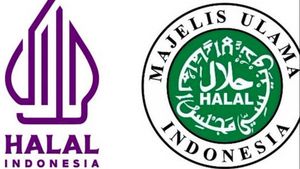The new halal logo reaps the pros and cons. In plain view, there are significant changes from the previous logo. However, the essence remains the same, there is the word halal which will be used as a marker if the food, beverage, cosmetic, drug, ingredient, etc., which are labeled with the logo have been researched and the halal certificate issued. According to Dr. Muhammad Aqil Irham, M.Si, Head of the Halal Product Assurance Agency (BPJPH), this new halal logo is a cross-cultural collaboration.
***
Halal and non-halal issues are very sensitive for Muslims. Because there is a value of obedience in carrying out religious teachings in it. Muslims are allowed to consume or use halal ingredients and leave materials that are prohibited or haram for consumption and or use.
However, along with the times when the Muslim population is very large, the halal logo already contains a business dimension. All types of goods labeled as halal from an authorized institution will be trusted by the public and sales will increase.
The change in the halal logo which was originally issued by MUI and has now shifted to the BPJPH of the Ministry of Religion of the Republic of Indonesia has received many responses. According to Dr. Muhammad Aqil Irham, M.Si. There is cross-cultural collaboration in this new logo. “This new logo combines or integrates Islamic values with Indonesian culture and values. Although the characteristics of Indonesia, but not lost its Islamic style. The purple color contains the philosophical meaning of inner and outer unity, which is also related to theology, faith, and divinity,” explained Aqil.
The cost of this halal certification for MSEs (micro and small businesses) is set at zero rupiah or free. The cost incurred is IDR 300 thousand, but it is borne by the state for the self-declared category (self-declaration). As for the regular IDR 650 thousand. Meanwhile, for medium and large businesses, the normal tariff is IDR 5 million and IDR 12.5 million, respectively. "Indeed, there is a government siding with MSEs," he said.
For Muhammad Aqil Irham the pros and cons that are happening now have a positive side. The process of socializing the new halal logo is getting faster. “This is a learning process for the public, so there is a positive, faster socialization. That is one form of public communication that occurs naturally. There is a lesson, thank God, we are grateful that we are still being watched," he said to Iqbal Irsyad, Edy Suherli, Savic Rabos, and Rifai who met him at the BPJPH office, Pondok Gede, East Jakarta, recently. Here's the excerpt.

Since when the discourse on changing the halal logo was initiated, who was the first to propose it and how was the process of processing it until it was decided?
In the context of changing the halal logo, BPJPH only carries out the mandate of the regulations. Namely Law Number 33 of 2014 concerning Halal Product Guarantee and Government Regulation Number 39 of 2021 concerning the Implementation of the Halal Product Assurance Sector. These two regulations delegate authority to BPJPH to determine and determine the halal label that applies in Indonesia from the beginning was carried out by MUI.
On that basis, we have appointed a team to conduct scientific studies. We also held discussions within the internal environment and also held discussions with various external parties. In the process, around 11 designs of halal logo labels emerged. There are square, round, pyramid shapes and there are triangles and pentagons. Each logo proposal has its own philosophical content. Finally, we decided on a logo that had already spread to the public through media coverage. Apart from internal parties, there are also external parties who have competence in the logo field. We asked them to give an assessment.
This new halal logo has been announced, but not yet officially launched, when will it take effect?
This new halal logo was determined through the Decree of the Head of BPJPH Number 40 of 2022 concerning the Determination of the Halal Label. This decree was issued in February 2022, but is effective March 1, 2022. Actually, this logo has not been launched, the plan is to launch this halal logo at the end of March 2022, but many people have commented on this. It's okay, this is part of the socialization, publication, promotion, as well as education to the public; consumers, and producers so that they can be more familiar with this new logo.
Many have commented on this logo, starting from the shape, writing to color, what is the philosophy behind this new logo?
This new halal logo contains, firstly, a logogram that is formatively true, which gives the impression of being Javanese-centric. But we also want to say that this mountain-like shape is also the shape of most of the domes of mosques in Indonesia. Then there are the vertical stripes; This striated motif was first coined by Sunan Kalijaga, who carried out da'wah with a cultural approach. This is the medium for writing Kufi Arabic calligraphy, in which the writings are Ha, Lam Alif, and Lam, so the reading is halal. So this is very clear. Then there is also halal writing in Latin letters.
The presence of this new halal logo gives us the momentum to introduce the art of Kufi calligraphy through this logo. In this logo, there is a blend of Islamic art and culture with the cultural arts of Nusantara. That's what the puppet shows (mountains in the puppet) or the dome of the mosque. Then the question is that wayang is Indonesian culture or not? If we read the literature there are many opinions about wayang, there are experts who say they are from Java, China, and India.
In the book 'Wayang, Kebudayaan Indonesia dan Pancasila' written by Pandam Guritno in 1988, that wayang is not only known in Java, in Nusantara there are many different styles, in Sumatra, Kalimantan, Bali, Lombok, and other areas, puppets are also known with their respective versions. So it is actually a cultural tradition and cultural artifact of the archipelago.

So there is a combination of Islamic values and Nusantara culture, right?
Yes, that is what we want to achieve through this halal logo, combining or integrating Islamic values with Indonesian culture. Although the characteristics of Indonesia, but not lost its Islamic style. The purple color symbolizes the philosophical meaning of inner and outer unity, also related to theology, faith, and divinity. Practically, purple can be clearly seen by the people when it is pinned, it will be installed in food and beverage product packaging. So the halal label will be side by side with the BPOM logo, Green, etc. We want business actors to not be bothered by putting up a lot of labels. So we are looking for a size that fits the height, width, color. The color is clear so that it can be easily read by consumers, purple should be placed on a white base color. It is very clear, besides that, there will be a turquoise green base color that is integrated into the halal logo, accompanied by a certificate number and registration number.
You said earlier that there were several types of halal logos entered, before finally choosing one. How to determine the halal logo?
We discussed it internally, then we looked for a logo consultant. Because this needs scientific references, apart from the branding side. There are also philosophical, juridical, sociological views that are also considered. Then we discussed and many alternative sessions were born. This logo is our choice because the visualization is clear, simple, and easy to see. So it is determined by the internal team and input from external. Finally selected the current one.
When is this logo effective to use?
Practically, the use of this halal label is for products registered since March 1, 2022. For old products that still have stock of the old halal logo, they are given the opportunity to spend their stock. We want to make it easy until the time limit for the transition is complete and the transition to the use of this logo is 5 years. Government regulation 39 of 2021 states, before this regulation was promulgated the existing halal logo was still valid until 2026.
How long is the validity of a halal certificate given to a certain product?
The halal label is based on a halal certificate, the MUI (Indonesian Ulema Council) is valid for 2 years, the halal certificate from BPJPH is valid for 4 years. So if business actors get a halal certificate from the MUI, they have to register with BPJPH. Two years from now everything is uniform.
Apart from changing the logo, there was also a transfer of authority from MUI to BPJHH, can you explain this!
Although there is a transfer of authority, the MUI's role is still in the halal certification process. There are 3 actors involved; The first is BPJPH, the entry point for the certification application, and at the same time the issuer. The second application is processed by the Halal Inspection Agency (LPH). This LPH consists of experts who research a material, the name is halal auditor. The results of the halal auditors are submitted to the MUI to issue a fatwa. MUI conducts a trial to check the results of this expert, whether it has complied with the provisions of Islamic law or not. If so, BPJPH will issue a decision. This is the basis for BPJPH to issue a halal certificate.
So actually there are respective authorities that cannot interfere with each other, do not overlap each other in it. So there is an administrative authority area (BPJPH), a scientific authority area (LPH), then MUI issues its fatwa.
The halal industry has become a global trend. There are 45 halal institutions from outside that want to cooperate with BPJPH. Manufacturers from western countries are enthusiastic about getting halal certification because they see the Muslim market as big. The amount is 1.8 billion, the annual expenditure is almost 2.2 trillion dollars. Halal is not only religious observance but has become a lifestyle.
How is the halal certification management service at BPJPH?
We implement an online-based one-stop integrated service. There are also live and virtual consulting services. BPJPH's commitment to serve the public administratively with the slogan easy, fast, and cheap.
SEE ALSO:
How much does this halal certification cost?
The main reference for Minister of Finance Regulation 57 is the lower tariff and upper tariff. For MSEs, there are regular and self-declaring schemes. For free self-declaration, the fee is charged to the state. Last year there was a problem, why in the Law there was zero rupiah, but in reality, it was expensive. There are three million, four million, and some, even more, are allocated by the Ministry, Provincial Government Institutions, and Regency Governments which are allocated in the APBN/APBD to help MSEs take care of halal certification. Therefore, as of December 1, 2021, we will reduce the cost from IDR 3 million to IDR 300 thousand. The regular tariff is IDR 650 thousand for MSEs.
What is the difference between regular and self declare?
Self declare is for simple products, which are zero risk and low risk. This does not need to be checked by LPH, it is enough to be accompanied by a PPH assistant who will check the ingredients, composition, and halal production process. Beyond that, categorized into regular. For medium and large scale businesses, the cost is normal, it's reasonable. The problem is in accordance with their abilities and this also adds added value to their products. They pay independently and are valid for 4 years. So there is a government side for MSEs.
What is BPJPH doing to create a halal ecosystem?
We cannot work alone to create a halal ecosystem. We work together, synergize, and collaborate with other stakeholders in the field of halal product assurance. Not only LPH, with other institutions including universities and Islamic organizations.
This halal certification obligation has a transformation from voluntary to mandatory, which used to take care of voluntary certificates, now it is mandatory. The halal certification obligation is implemented in stages. The first stage starts from October 17, 2019, to October 17, 2024, for food, beverage, and slaughter products. The time span of 5 years has now been running for more than 2 years. This is our opportunity to socialize, publish, promote and educate the public so that they want to implement halal certification. Later, after 2024, everything is mandatory.
Then the second stage from October 17, 2021, to October 17, 2026, is for cosmetic products, medicines, and materials used, such as shoes, socks, clothes, glasses, rings, clocks, etc., as long as there are animal elements. Also from the aspect of the manufacturing process, packaging, transportation to the outlet. It is a unit from upstream to downstream.
How do you deal with the pros and cons of this new halal logo?
We have to be patient with this situation. Don't compare it with the MUI halal logo which has been around for more than 30 years. Now being socialized. Do not know, then do not love. The current polemic is a learning process for the public, so there is a positive, faster socialization. That is one form of public communication that occurs naturally. There is a lesson, thank God, we are grateful that we are still being cared for.
Muhammad Aqil Irham Now Reduces Time of Staying Up Late

Do you remember the very popular words in a dangdut song belonging to Rhoma Irama which carries the theme of staying up late? Yes, about staying up late. Do not stay up too much if it means nothing. Apparently, Dr. Muhammad Aqil Irham, M.Si, who now serves as the Head of the Penal Agency (BPJPH) also applies the message of the song. “Now I reduce the habit of staying up late. Except for important things," he said. All is done for the sake of his health to be better and fit.
According to Aqil – as he is usually called – adequate rest is one of the keys for him to stay fit during the current pandemic. It's understandable that the tasks that have piled up in the office coupled with other activities really take up their time. Because it needs adequate rest after being separated from the routine at the office.
"First, get enough rest, to be honest, I actually can't stay up late anymore. Because it's my habit to sleep late at night. I talk a lot with my friends," he admits.
He realized that the habit of staying up late by chatting until late at night was not good for health. “Now I have to limit the habit of staying up late. I try to be late at 11.00 pm, I have to finish and rest," he said.
Is the habit of staying up late really stopped? Apparently not. Currently, Aqil is still in the process of reducing the habit of staying up late. Under certain conditions he still stays up late, although not as often as before. "At least once a week, that's for the important things," he said.
In addition, he also tries to do light exercise to accompany his activities to reduce staying up late. "I took the time to do light exercise such as morning walks while listening to the birds chirping that I kept," he said.
The key, continued Aqil, is balance and not overdoing it. "So don't stay up too much, exercise, and get enough rest. That's all my tips for maintaining health," said the lecturer at the Raden Intan State Islamic University, Bandar Lampung.
Natural

Awareness of maintaining the body's immunity increased dramatically during the pandemic. Consuming multivitamins and zinc, herbs, and other traditional ingredients are widely practiced by the community. But for Aqil, he prefers traditional ingredients to multivitamins that are widely circulated now.
“Frankly, I am lazy to take vitamins in capsule or tablet form. I just take medicine or multivitamins when I'm sick. Sometimes I don't even finish it," he continued.
He prefers to consume traditional ingredients such as herbal medicine and other traditional ingredients which are equally effective in increasing the body's immunity. “I prefer traditional and natural drinks. Like herbs, ginger hot drink, or other traditional ingredients,” he said adding drinking lots of water was one of the tips for a healthy life that he was running.
Fasting is also often done by Aqil to make the body healthy. "I think it's to compensate, because I eat constantly but do not exercise regularly, so the anticipation is to control the food that goes into the stomach or fasting. As we know we are commanded to fast in order to be healthy. So besides worship, fasting also makes the body healthy," he said.
Communication

When he first served in Jakarta, he did not bring his family who live in Bandar Lampung with him. Meanwhile, his four children who have grown up are now studying in other cities on the island of Java.
Luckily, the sophistication of communication technology makes communication between Aqil, his wife, and four children still maintained through the family WhatsApp group. “We have a WhatsApp group to communicate with each other. Through the GWA, we also remind each other to wake up at dawn, pray Maghrib, and so on," he said.
Sometimes just asking the four children had lunch or not. Small things can glue those who are now separated from one another. “Sometimes I ask the children what time they go to college today, what time do they go to school, and so on. So we remind each other in the group, the six of us, don't stop communicating," he explained.
Therefore, said Muhammad Aqil Irham, he is grateful that the sophistication of today's communication technology makes long distances feel close. “Try in the days of my father or grandfather, where there was a GWA or communication tool that was as sophisticated as now. So we use it to stick together, remind each other and greet one another. So we take advantage of technological sophistication for positive things," he said.
“This new logo combines or integrates Islamic values with Indonesian culture and values. Although it has Indonesia characteristics, but not lost its Islamic style. The purple color contains the philosophical meaning of inner and outer unity, which is also related to theology, faith, and divinity.
Muhammad Aqil Irham
The English, Chinese, Japanese, Arabic, and French versions are automatically generated by the AI. So there may still be inaccuracies in translating, please always see Indonesian as our main language. (system supported by DigitalSiber.id)
















